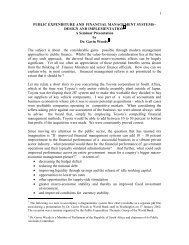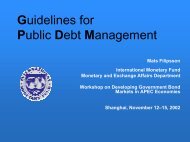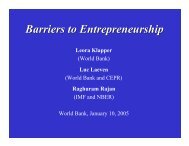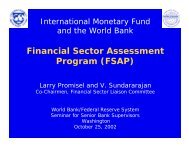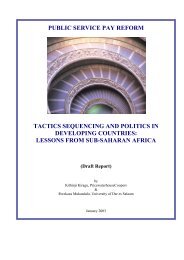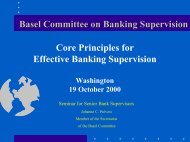CORRUPTION ASSESSMENT: MOZAMBIQUE - World Bank
CORRUPTION ASSESSMENT: MOZAMBIQUE - World Bank
CORRUPTION ASSESSMENT: MOZAMBIQUE - World Bank
You also want an ePaper? Increase the reach of your titles
YUMPU automatically turns print PDFs into web optimized ePapers that Google loves.
The consequences of external aid. While technical or capacity constraints partly explainthe weaknesses described above, they are reinforced by the incentives created by externalaid. Traditional project assistance has fragmented government planning, budgeting andmanagement. Since projects are negotiated directly between donors and line ministries, orindividual directorates within them, and the associated funds are often off-treasury (if notentirely off-budget), this form of aid financing weakens the authority of MoF vis-à-visthe line ministries and, in theory, undermines executive accountability to the NationalAssembly (although at present there is little real accountability). According to theNational Directorate of National Accounts (DNCP), off-budget external grants andMinisterial generated funds could add up to about a third of total expenditures, yet noneof these show up on government budget statements, seriously undermining a keymechanism of accountability.The line ministries’ direct access to resources, either from donors or mobilized on theirown (from inspection fees and other such means) reduces the incentive for thegovernment as a whole to engage in hard choices about resource allocation. Ministersrationally prefer to direct their efforts towards maximizing access to the funds availablefrom donors at the sectoral level, which they see as the easiest way to achieve theirpriorities, obviating the need to engage in political debates over development strategy andrunning the risk of infighting over prioritization.To overcome the disadvantages of traditional project assistance, many donors have begunto provide some of their assistance to Mozambique in the form of “program support.”This takes the form either of untied common funds within individual line ministries,linked to sector strategic plans, or general budget support (GBS). The sectoral commonfunds have helped to reduce the fragmentation caused by project financing within lineministries. GBS is untied budgetary assistance to the government as a whole. It adds tothe resources available for allocation in the “normal” budget process and increases MoF’sinfluence vis-à-vis the sector ministries. At the same time, GBS can itself be a distortionof local “markets” and creates its own externalities. For example, GBS funds can be wellmonitoredand accounted for to donors, while other public resources are essentially freedup for private gain.Weak internal demand. The influence of donors contrasts with the weakness of theinternal pressure on the government from Mozambican society. Although the NationalAssembly plays a formal role in debating and approving the OE, it has no real ability toact as a check on the executive in the budget process. Besides capacity limitations and thepolarized nature of inter-party relations in the National Assembly, these constraintsinclude: (i) poor presentation of the budget document, which is difficult for deputies tounderstand and analyze; (ii) the fact that tax rates are not set as part of the budgetlegislation submitted to the National Assembly; (iii) the wide latitude given by law to theexecutive to reallocate expenditure after the National Assembly’s approval of the budget;(iv) the off-budget practices, mentioned above, which limits the government’s and theNational Assembly’s oversight of the budget; (v) the long delays in submitting theaudited Conta Geral do Estado (CGE) to the National Assembly; (vi) the failure of theexecutive to involve the National Assembly in the debate, approval and monitoring of theFINAL REPORT 28


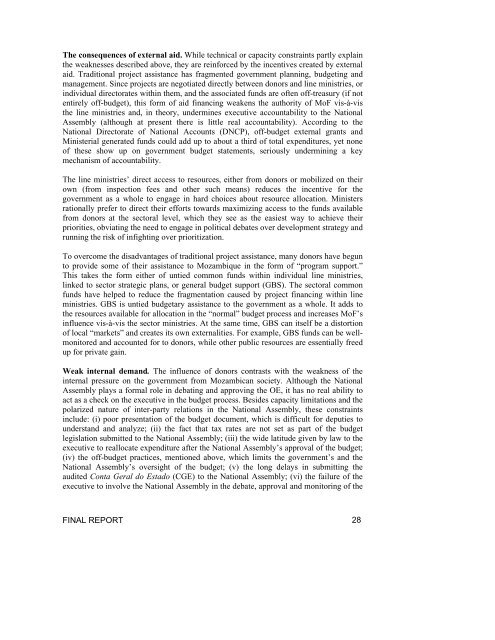
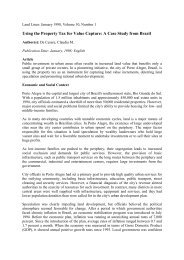

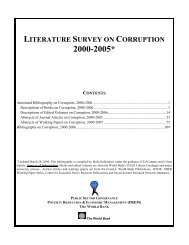
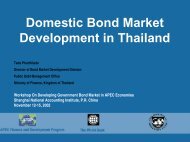
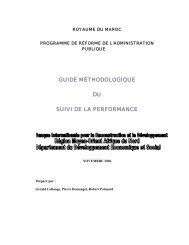
![Budget Execution: Overview [PDF 453K]; Bill Dorotinsky - World Bank](https://img.yumpu.com/47844909/1/190x143/budget-execution-overview-pdf-453k-bill-dorotinsky-world-bank.jpg?quality=85)
